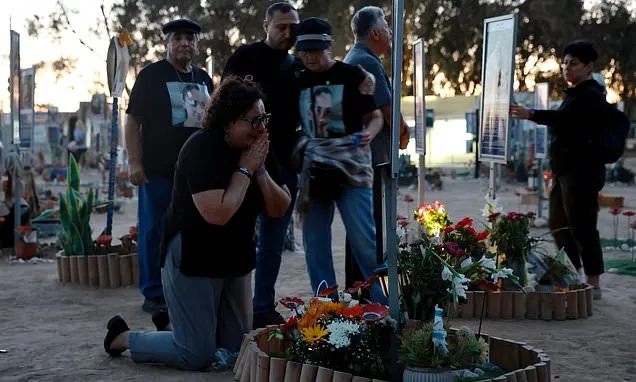The BBC has apologised after referring to Hamas's October 7 attacks as an 'escalation' on the second anniversary of the massacre that left more than 1,200 people dead.
The wording appeared in an internal email to BBC News staff marking two years since the atrocities, sparking fury and accusations of anti-Israel bias inside the broadcaster.
Rather than showing the Israeli victims of Hamas's murderous rampage, the message was accompanied by a picture of Palestinian women and children picking their way through rubble in Gaza.
The email formed part of a regular update from the BBC Audiences team, which analyses audience data and advises journalists and producers on how best to engage viewers and listeners.
It said: 'As we reach the two-year anniversary of the escalations in the Israel-Gaza conflict, we asked UK audiences what they want and need from news coverage moving forward.'
The wording provoked an immediate backlash - with critics accusing the corporation of downplaying the horrors of October 7 and once again showing bias against Israel.
Adam Ma'anit, whose cousin, Tsachi Idan, was taken hostage from the Nihal Oz kibbutz on October 7 and murdered in captivity, condemned the BBC.
He said: 'To use that language and framing is incendiary and insulting.
'That this report was circulated today of all days speaks to an institutional bias within the BBC that is shocking and distressing. Does our pain not count?'
Natalie Sanandaji, a survivor of the October 7 Nova festival massacre, said: 'To make such a 'mistake' on October 7 of all days is painful for me to see as a survivor of the Nova festival. Once again, it feels the media is trying to downplay or erase what happened to us on October 7, what started this war: an attack on Israel by Hamas.
'I would have hoped that the media would respect our pain for just one day, the way they respect the pain of the people of Gaza all year round for the past two years.'
After several staff members reportedly complained about the email's wording and the choice of image, the BBC issued an apology.
A spokesman told the Mail: 'This internal staff email should have been worded differently and we're sorry for any offence caused. We are editing it and will replace the text on our intranet.'
It is understood the message was written by a junior member of staff.
A BBC source said the image of Gaza was used because the email discussed current audience attitudes to the Israel-Gaza conflict.
The row is the latest in a long line of controversies for the corporation over its coverage of Israel and Hamas.
Since the attacks two years ago, the BBC has repeatedly faced accusations of bias including criticism for refusing to call Hamas terrorists in its early reporting of the massacre.
Just three days ago the broadcaster was also criticised by Jewish leaders for broadcasting a programme hours after the Manchester synagogue attack where an expert blamed Israel and the British government for the atrocity that claimed two lives.
It aired the news talk show called The World This Evening on its controversial Arabic service channel, which is part of the licence-payer-funded BBC World Service.
In the show, broadcast on Thursday evening to millions in the UK and across the Arab world, presenter Mohammed Saif Al-Nasr interviewed a Jewish rabbi called Jonathan Romain, and a Cambridge-based Midde East expert called Dr Makram Khoury-Machool, a Palestinian himself.
During the 14-minute exchange, the two guests were asked about the attack by Jihad Al-Shamie, 35, on the Heaton Park synagogue earlier in the day, which left two Jewish worshippers dead and three injured.
Police shot dead Al-Shamie himself, who was carrying a knife and fake suicide device on him.
Whilst British and Muslim leaders in the UK condemned the terrorist attack, Dr Khoury-Machool appeared to blame the British government and the support of Jewish leaders of the Israeli prime minister Benjamin Netanyahu's war.
Dr Khoury-Machool said: 'The Jewish community and the British government cannot treat such an incident in Britain as though it fell from the sky, and suddenly the perpetrator carried out the attack and assaulted a Jewish synagogue.
'The British government must inquire on its own police and statements. When we listen to the Jewish leadership, they either support the Israeli occupation, and most of them do - it is not possible for a British Jewish leader to endorse Netanyahu's crimes and not expect there to be reactions on the British street.'
